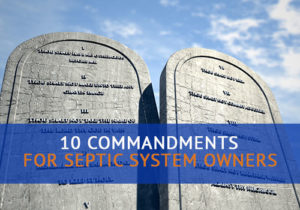 Over the past few months, we’ve given plenty of advice for septic tank owners. But, all those great details can be overwhelming. So, we are going to keep it simple. Here are the 10 Commandments for Septic System Owners—all the septic rules in one place.
Over the past few months, we’ve given plenty of advice for septic tank owners. But, all those great details can be overwhelming. So, we are going to keep it simple. Here are the 10 Commandments for Septic System Owners—all the septic rules in one place.
1. Thou Shall Pump When Needed
Your septic tank never rests. It’s always breaking down waste, processing wastewater before moving it to the drainfield. And it doesn’t like to be forgotten.
A properly working septic tank will need pumping every 3-5 years on average. This allows for removal of waste accumulation and sludge that the healthy bacteria in your tank can’t break down.
2. Thou Shall Not Flush “Flushable” Wipes
Perhaps the biggest misnomer surrounding septic systems, “flushable” wipes are killing your septic tank. If they don’t break down in a blender, they won’t break down in your tank. Save your system and your wallet, and toss though “flushable” wipes in the trash instead.
3. Thou Shall Follow All “Do Not Flush Rules”
In fact, toss everything but toilet paper in the trash. It’s time to stop treating your septic system like a trashcan.
What should get tossed and not flushed?
- Feminine Hygiene Products
- Condoms
- Paper Towels
- Diapers
- Baby Wipes or Any “Flushable” Wipes
- Dental Floss
- Cleaning Chemicals
- Sponges
- Q-Tips
- Cotton Balls
- Liquid or Tablet Medication
- Cigarette Butts
- Band-Aids
- Cat Litter
- Hair Clippings
- Chewing Gum
4. Thou Shall Not Abuse the Garbage Disposal
It’s easy to avoid the dreaded garbage smell and toss everything down the disposal. I mean, that’s what it’s for right? Wrong! Your garbage disposal is not your trashcan.
Overuse and improper use are causing septic owners headaches because of the damage to the delicate septic tank balance. What should you avoid stuffing down the drain?
- Fibrous and Stringy Foods
- Bones, Seeds or Pits
- Coffee Grinds
- Oil, Fats and Grease
- Egg Shells
- Beans, Rice and Pasta
- Potato Peels
- Non-Food Items
5. Thou Shall Avoid Chlorine Bleach Products
Praised for its antibiotic powers chlorine bleach doesn’t discriminate where it kills bacteria—on your counters, in the sink, and in your septic tank. And it’s found in everything: laundry detergent, toilet cleaners, shower cleaners, surface cleansers.
Save your tank. Replace bleach-based products with natural alternatives like baking soda, vinegar, hydrogen peroxide and lemon juice. If you must use bleach use it sparingly and in low-concentrated doses.
6. Thou Shall Conserve Water
The less, the better. All the pipes lead to your septic system. The more water your system has to process the more work it has. The more work, the more backed up—eventually leading to some significant problems. It’s time to start conserving water. Here are a few tips to get you started.
7. Thou Shall Lay Out the Rules
Don’t just assume the extended family knows proper septic tank behavior. They probably don’t. Unfortunately, it’s not always the ideal topic for conversation.
Instead, think about putting up friendly septic signs as reminders in the bathrooms. Your guests may not even be aware you have a septic tank! Set your septic up for success.
8. Thou Shall Only Plant Septic Safe Plants & Trees
No one enjoys a dirt patch for a yard—and it’s not a requirement for septic system owners. In fact, plants, flowers, and trees help reduce soil erosion and regulate moisture. It’s all about knowing what plants and trees are safe for your septic tank and how far away to plant them.
The rule of thumb is simple: the smaller the better. Not just above ground, but below as well. Think small roots. Want some trees for shade? Look into the Dogwood Trees or a Japanese Maple Tree.
9. Thou Shall Not Park on the Septic Tank or Drainfield
Knowing roots can damage your septic system, it should not be a surprise that your car can too. In fact, any heavy object can hurt your styem.
Florida soil is renowned for being pourus and moist. This means its weight bearing capacity is relatively low. Save yourself a headache. Don’t park on your septic or drainfield.
10. Thou Shall Help Protect Nearby Water Sources
An improperly working system doesn’t just hurt you—it hurts the community too.
Water contamination occurs readily when your septic becomes overloaded or clogged. This contamination goes farther than the groundwater; it can get into the communities drinking water supply. Protect nearby water sources by:
- Inspecting your system regularly.
- Going phosphate free.
- Start composting.
- Upgrading your system.
- Increasing your setbacks.
The Ten Commandments for septic system owners. May they help you keep your septic tank happy and healthy.

